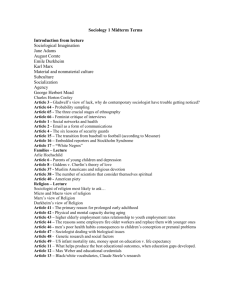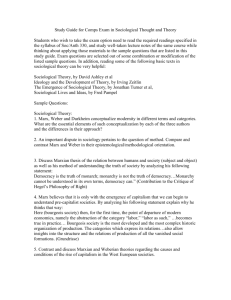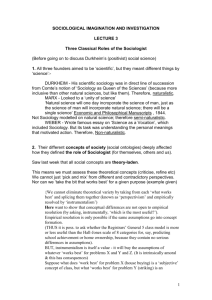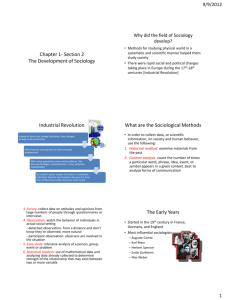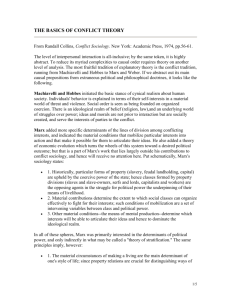Economy and Society in Marx, Durkheim, and Weber The economy
advertisement
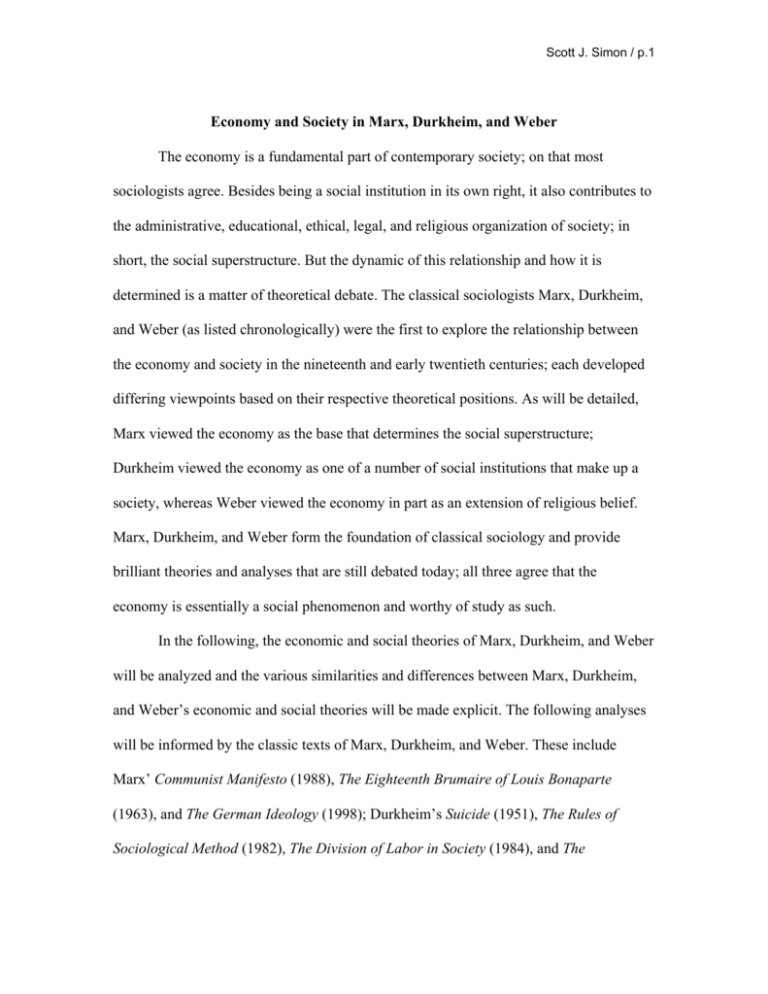
Scott J. Simon / p.1 Economy and Society in Marx, Durkheim, and Weber The economy is a fundamental part of contemporary society; on that most sociologists agree. Besides being a social institution in its own right, it also contributes to the administrative, educational, ethical, legal, and religious organization of society; in short, the social superstructure. But the dynamic of this relationship and how it is determined is a matter of theoretical debate. The classical sociologists Marx, Durkheim, and Weber (as listed chronologically) were the first to explore the relationship between the economy and society in the nineteenth and early twentieth centuries; each developed differing viewpoints based on their respective theoretical positions. As will be detailed, Marx viewed the economy as the base that determines the social superstructure; Durkheim viewed the economy as one of a number of social institutions that make up a society, whereas Weber viewed the economy in part as an extension of religious belief. Marx, Durkheim, and Weber form the foundation of classical sociology and provide brilliant theories and analyses that are still debated today; all three agree that the economy is essentially a social phenomenon and worthy of study as such. In the following, the economic and social theories of Marx, Durkheim, and Weber will be analyzed and the various similarities and differences between Marx, Durkheim, and Weber’s economic and social theories will be made explicit. The following analyses will be informed by the classic texts of Marx, Durkheim, and Weber. These include Marx’ Communist Manifesto (1988), The Eighteenth Brumaire of Louis Bonaparte (1963), and The German Ideology (1998); Durkheim’s Suicide (1951), The Rules of Sociological Method (1982), The Division of Labor in Society (1984), and The Scott J. Simon / p. 2 Elementary Forms of Religious Life (1995); and Weber’s Economy and Society (1968), and The Protestant Ethic and the Spirit of Capitalism (1930). Marx The economy is at the center of Marx’ sociological theories; he considered society to be the result of an economic base and a social superstructure; it is the economic base which determines all other social structures including ideology, politics, and religion. Marx’ earliest development of his social and economic theories can be found in The German Ideology (1998). In the text, he critiques Hegelian and Post-Hegelian philosophy and opposes German ideology with the history of class struggle. For Marx, history is dependent on the existence of human beings, who produce their own means of subsistence, and the resulting means of production determines their way of life (1998:37). The economy that forms from the means of production results in the division of labor and forms of property. Three main forms of property are found in history: tribal, ancient, and feudal. The tribal form of property follows the social structure of the family and is relatively primitive; the ancient form of property follows the development of cities created from the union of multiple tribes; the feudal form is the result of the development of countries and guilds of craftsmen. Marx claims that social and political structures are derived from the economic means of production (1998:43). Consciousness is also determined by the means of production; therefore, all ideology derived from consciousness is part of the social superstructure. For Marx this social superstructure is determined by the economic base of a society. This economic base includes the division of labor; a division that harbors Scott J. Simon / p. 3 conflict between common and individual interests (1998:52). In this sense, the state, which is the result of the common interest, is opposed to individual interest. It is communism and the communal control of the means of production that offers freedom from the tyranny of the common interest of the state, with its imposed division of labor and privatization of property (1998: 52). Marx claims that the modern form of the state serves the interest of the ruling economic class by oppressing the collective interest of the proletariat. The only solution is a revolution in which the dominant modes of production are abolished altogether (1998: 61). It is the ruling economic class that determines the dominant ideology in a society, as Marx states “the class which is the ruling material force of society is at the same time its ruling intellectual force” (1998:67). And it is class interest that the proletariat must oppose with revolution; to simply form a new ruling class would defeat the purpose of the revolution. Another benefit that communism has to offer is freedom from the means of production according to Marx. When division of labor and private property are abolished by communal ownership, individuals are free to pursue their own interests (1998:86). In The Communist Manifesto (1988), Marx’ explains his theory of revolution based on economic class struggle. Marx claims that communism opposes the power of oppression. This oppression is the effect of a class war; all of history can be analyzed in terms of this class war according to Marx: The history of all hitherto existing society is the history of class struggles. Freeman and slave, patrician and plebeian, lord and serf, guildmaster and Scott J. Simon / p. 4 journeyman, in a word, oppressor and oppressed, stood in constant opposition to one another, carried on an uninterrupted, now hidden, now open fight, a fight that each time ended, either in a revolutionary reconstitution of society at large, or in the common ruin of the contending classes. (1988:55) The history of class warfare has resulted in modern bourgeois society, which can trace its origins to the feudalism that preceded it: The modern bourgeois society that has sprouted from the ruins of feudal society, has not done away with class antagonisms. It has but established new classes, new conditions of oppression, new forms of struggle in place of the old ones. (1988:56) The main characteristic of modern bourgeois society is the class antagonism of the Bourgeoisie (capitalists) and the Proletariat (workers). The proletariat is subordinate to and serves the bourgeoisie, who own the means of production. Modern industry and the establishment of the world-market are the result of the bourgeoisie, who operate by means of “free-trade,” and exploit the proletariat in the form of wage-labor. According to Marx, the bourgeoisie “has agglomerated population, centralized means of production, and has concentrated property in a few hands” (1988:59). This has resulted in political centralization and the formation of nation states, which enforce the rights of the bourgeoisie to exploit the proletariat. The history of modern bourgeois society is the continuous revolt of the forces of production against the conditions of production; this revolt reaches a crisis in what Marx Scott J. Simon / p. 5 refers to as the “epidemic of over-production” (1988:60). When productive forces reach a state in which industry can no longer grow, a period of bourgeois sanctioned destruction occurs. This restores the economic means necessary for continued industrial expansion. For the bourgeoisie, labor is an economic commodity like other material goods, and the proletariat is forced to sell its labor on the market and face inhumane working conditions. As Marx points out, the workshop has been replaced by the factory, and the quality of work has decreased considerably; marginal skills are all that are required to operate the machines of modern industry (1988:61). It is the bourgeoisie that manipulate the proletariat for their own ends, and the proletariat, a disorganized class, initially rebel against this exploitation sporadically at the local level. The continued growth and development of industry leads to the concentration of power in the proletariat and trade unions form and there are sporadic riots or strikes. But, the competition between the workers themselves undermines their struggle. Similarly, the bourgeoisie by necessity provide a minimum education for the proletariat; this is needed in order combat the competition of the bourgeoisie in other markets (1988:64). By this, and with the defection of sympathetic bourgeoisie to the side of the proletariat, a revolution is prepared for in which the proletariat dissolves individual property. This revolution ends all others, it is the majority, the lowest strata of society, that here emancipates itself and does away with class distinctions altogether in the formation of communistic society. Communism for Marx is the universal political expression of the proletariat, divested of national interest. The communists work to form the proletariat into an Scott J. Simon / p. 6 organized class, help them to overthrow the bourgeoisie, and seize political power (1988:67). And all this is accomplished with the aim to abolish private property. Marx sums it up in Part IV: In short, the Communists everywhere support every revolutionary movement against the existing social and political order of things. In all these movements they bring to the front, as the leading question in each case, the property question, no matter what its degree of development at the time. (1988:86) As a real world example of such class struggle, Marx applied his theory of historical determinism to the coup d’etat of Louis Bonaparte in The Eighteenth Brumaire of Louis Bonaparte (1963). Marx outlines the events leading up to the coup and concluded that while no communistic revolution, the coup was nonetheless an example of class struggle. Thus, for Marx the economy is the cause of the resulting social superstructure (ideology, politics, religion). The disparity between the ruling class, which owns the means of production, and the proletariat, which provide the labor, results in a history of class warfare; Marx predicted that such class warfare would eventually culminate in a communistic revolution in which private ownership of the means of production and class distinctions were abolished for good. Durkheim Unlike Marx, Durkheim considers the economy to be one of many contributing factors that make up a society. The economy has no privileged position in relation to the Scott J. Simon / p. 7 social superstructure, but is one social fact among others. In The Rules of Sociological Method (1982) Durkheim defines a social fact as an external thing that has a coercive force by which it exercises control over an individual (1982:52). This control can be economic, but it can also be ideological. Durkheim contrasts social facts from organic (biological) or psychical (psychological) facts. Sociology is distinguished by the study of social facts. The beliefs, tendencies, practices of groups taken collectively are what constitute social facts (1982:54). These include the economy, but are much more. Durkheim’s form of sociology moves far beyond the economic analyses of class warfare found in Marx, and while a reformist motive can be found in Durkheim it is not exclusively economic. Durkheim was critical of what he called Marx’ economic materialism: Even without setting against economic materialism any definite facts, how can one fail to notice the inadequacy of the proofs on which it rests? Here is a law which lays claim to being the key to history. Yet, in order to demonstrate it, one is content to cite a few scattered and disjointed facts, which together make up no methodological series and whose interpretation is far from being settled. (1982:172) In short, Marx was too eager to jump to conclusions instead of letting the evidence speak for itself. And what evidence there was in Marx favor, it was not enough to convince Durkheim of its validity: “Not only is the Marxist hypothesis unproven, but it is contrary to facts which appear established” (1982:173). What Marx’ economic theory provides according to Durkheim is “a rule of method, not a law from which one is justified in Scott J. Simon / p. 8 deducing important consequences, whether theoretical or practical” (1982:173). Durkheim considered religion to be an important factor on the economy as well as law, morality, art, science, and political forms. And Durkheim thought it was much more likely that the economy was dependent on religion: Durkheim asks “is it not probable that the economy depends on religion and not vice versa?” (1982:173). And Durkheim refused to make of the economy the substructure of society as with Marx; the evidence lead him to believe on the contrary that the economy is secondary and derived (1982: 174). Durkheim defined the term anomy as a condition where social and/or moral norms are confused, unclear, or simply not present; this lack of norms (or pre-established limits on behavior in a society) inevitably causes deviant behavior: the structural forces that cause anomy, egoism, and suicide are the natural results of the decline of mechanical solidarity and the slow rise of organic solidarity due to the division of labor and industrialism; a condition that affected all social classes. In Suicide (1951:241) he identified two forms of anomic suicide related specifically to the economy: acute economic anomy distinguished by sporadic decreases in the ability of traditional institutions (such as religion, guilds, pre-industrial social systems, etc.) to regulate and fulfill social needs; and chronic economic anomy distinguished by long term diminution of social regulation. Durkheim identified this type of anomy with the ongoing industrial revolution, which eroded traditional social regulators and often failed to replace them. Industrial goals of wealth and property were Scott J. Simon / p. 9 insufficient in providing happiness, as was demonstrated by higher suicide rates among the wealthy than among the poor. Durkheim also argued that anomy could result from a sudden disturbance, crisis or rapid change of social and economic forces. In these conditions society becomes unable to exercise a regulating influence on expectations and behavior (1951:277). Economic values were also of interest to Durkheim; the dependence of preferences, and thus values, and standards of living, and forms of production upon prevailing moral, religious, and aesthetic opinion convinced Durkheim that such opinions were far more important to the political economy than economists were willing to concede. Durkheim argued that the comparative sciences of ethics, law, religion, and the arts, all deal with ideas; in contrast, political economy concerns wealth, which consists of things which are apparently objective and independent of opinion.; this lead many economists to conclude that the economy is the objective underpinning of the social sciences; hence the theory of economic materialism which makes the economic life the substructure of all social life. Durkheim rejected the idea that political economy is entirely “objective” and considered economic facts to be a matter of opinion. The value of things depends not only on their objective properties, but on the opinions one forms of them as well. Fluctuations in opinion and taste give value to material objects. For example, if a particular religion proscribes wine or pork, then wine or pork partly lose their exchange value. And thus, religion, as well as ethics, law, and the arts can influence the economy. Durkheim also criticized political economists for dwelling on what ought to be Scott J. Simon / p. 10 rather than on what is: What economists dwell on most in their researches is the problem of knowing, for example, whether society should be organized on individualistic or socialist lines; whether it is better for the state to intervene in industrial and commercial relations or abandon them entirely to private initiative; whether the monetary system should be based on monometalism or bimetallism, etc. (1982:68) Durkheim goes so far as to claim that “the celebrated law of supply and demand has never been established inductively as an expression of economic reality” (1982:68). In contrast, Durkheim focuses on the social facts as opposed to any ideas about what should be: “what is given is not the idea that men conceive of value, because that is unattainable; rather is it the values actually exchanged in economic transactions” (1982:68). The economy is one of many factors that make up a society and has no privileged position in relation to the social superstructure for Durkheim. Social facts can be economic, but can also be ideological. And Durkheim emphasized that social facts must be studied prior to general conclusions concerning economy and society; as he states, “the conventional character of a practice or an institution should never be assumed in advance” (1982:70). Weber Weber inverts Marx’ economic determinism by suggesting that religious ideology can influence the economic social structure. Thus, religion forms the base and the Scott J. Simon / p. 11 economy the superstructure according to Weber’s theory. As a result economic forces are best understood through the sociology of religion, which Weber introduces in The Protestant Ethic and the Spirit of Capitalism (1930). He starts by emphasizing that the analysis of Occidental religions will have to suffice due to the lack of reliable data concerning the Asiatic religions. Also, the Occidental religions are unique to the problem of capitalism. Weber cites certain forms of music, architecture, and politics as unique to the West in addition to capitalism. Thus, Weber forms a cultural history in his analysis of Protestantism and capitalism. While the anthropological and biological sides of the problem are acknowledged, their lack of development at the time of Weber’s writing was such that they could not be reliably included in his analysis. For Weber, the main problem to be analyzed is the origin of the bourgeois, of which capitalism was its effect. Weber addresses a phenomenon particular to capitalism; its main practitioners, from skilled labor to business leaders and owners, tend to be overwhelmingly Protestant. He then suggests that "the supposed conflict between other-worldliness, asceticism, and ecclesiastical piety on the one side, and participation in capitalistic acquisition on the other, might actually turn out to be an intimate relationship" (1930:42). Historical factors alone cannot completely account for this; it is also a matter of control (1930:77). As opposed to Catholicism, which was relatively lenient in its control of individual life, the protestant reformation resulted in an intensification of the control of daily life. And the inheritance of wealth cannot completely account for it either; differences of education are also obvious. Catholics tend to favor a humanistic liberal arts education, while Protestants favor a technical and industrial oriented education. Religious minorities tend to be driven Scott J. Simon / p. 12 to economic activity due to the lack of political influence, but this is not the case with Catholicism. This contrasts with Protestantism, which has always and at all time been active as an economic force. This may be due to the fact that Catholics are attracted to security whereas Protestants are more attracted to the accumulation of wealth, but Weber disagrees. He sees the tendency to be more tied to the Protestant emphasis on piety, commerce, and freedom. Weber moves on to a tentative description of the spirit of capitalism in chapter two. The spirit of capitalism is best expressed in the words of Ben Franklin, of which Weber provides many examples. To summarize, what is esteemed and encouraged is the honest man of credit, who as a duty pursues the accumulation of capital as an end in itself. On closer analysis, Weber uncovers the profit motive as strictly utilitarian (1930:51). In this sense, the spirit of capitalism is a distinct ethic according to Weber. It is this capitalist ethic that Weber ties to the religious doctrine of Protestantism. And this capitalist ethic is a professed utilitarianism. Certain ethical precepts are encouraged because they are useful as a means to an end; this has lead to the criticism of the capitalist ethic as hypocrisy. For example, the appearance of honesty is as useful as actual honesty, both lead to the same result: the increased accumulation of credit and capital; and the appearance of modesty is as useful as modesty itself: both lead to the advantageous recognition of frugality. But the issue is not so simple for Weber, he cites Franklin’s own character, of which he believed was the result of the divine revelation of his capitalist ethic. So, utilitarianism cannot completely account for the capitalist ethic, a more spiritual, or religious element remains. This helps explain the irrational character of the Scott J. Simon / p. 13 capitalist ethic: the impulse to make money at any expense, and regardless of need, and at the same time the avoidance of any spontaneous enjoyment of living. But such a way of life make a virtue out of labor: Man does not 'by nature' wish to earn more and more money, but simply to live as he is accustomed to live and to earn as much as is necessary for that purpose. Wherever modern capitalism has begun its work of increasing the productivity of human labor by increasing its intensity, it has encountered the immensely stubborn resistance of this leading trait of pre-capitalistic labor. (1930:61). Weber goes on to suggest that it is not the profit motive so much as education that is responsible: For not only is a developed sense of responsibility absolutely indispensable, but in general also an attitude which, at least during working hours, is freed from continual calculations of how the customary wage may be earned with a maximum of comfort and a minimum of exertion. Labor must, on the contrary, be performed as if it were an absolute end in itself, a calling. But such an attitude is by no means a product of nature. It cannot be evoked by low wages or high ones alone, but can only be the product of a long and arduous process of education (1930:61-62). Profit is a moral obligation in modern capitalist society. In addition, there is an ascetic quality to the lack of spontaneous living that the capitalist ethic professes; and Scott J. Simon / p. 14 nothing is gained by the accumulation of wealth besides the satisfaction of having earned it (1930:71). As a complex whole made up of parts, it is rationalism that Weber analyzes in order to uncover the origins of capitalism. This leads to the analysis of Luther and the concept of the “calling.” As a religious conception, the “calling” was a duty to fulfill ones position in society according to the dictates of divine providence (1930:79). The calling was unique to protestant religions, and found its most visible expression in Puritanism: It is true that the usefulness of a calling, and thus its favor in the sight of God, is measured primarily in moral terms, and thus in terms of the importance of the goods produced in it for the community. But a further, and, above all, in practice the most important, criterion is found in private profitableness. For it that God, whose hand the Puritan sees in all the occurrences of life, shows one of His elect a chance of profit, he must do it with a purpose. (1930:162). Weber next turns to the reformation and Calvinism in order to determine the relationship between religious movements and the spirit of capitalism as found in modern industrialist societies. Weber considers the spirit of capitalism to be related in some way to a form of asceticism whose origin is found in Calvinism (1996:95). Weber goes on to trace the religious foundations of modern, or worldly, asceticism, to the protestant religion. This accounts for the irrational ascetic aspect of the modern capitalist, who accumulates wealth without enjoying it, and lives a life of duty towards his professional life in conformance with the capitalist ethic. Ironically, modern man is incapable of Scott J. Simon / p. 15 giving the spiritual significance to his materialist lifestyle and this is an underlying motivation for Weber’s analysis: he attempts to rectify the spiritual disdain expressed by modern materialistic capitalists in his detailed analysis of protestant asceticism; it is ironic that the modern materialistic lifestyle has its roots in an extreme form of spiritual asceticism. But, Weber does not want to substitute one oversimplification for another, spiritualism for materialism; both are only symptoms of the larger issues of the spirit of capitalism and its origins and development in modern industrialist societies. Perhaps Weber’s most important work, Economy and Society (1968) was a collection of notes never published in his lifetime. Weber begins Economy and Society by defining sociology as the science which attempts to interpret social action to arrive at a casual explanation of its course and effects. Action is social when, by virtue of the subjective meaning attached to it by the acting individual(s), it takes account of the behavior of others and is thereby guided. Thus, economy is a social phenomenon according to Weber. Economies result from communities, which are arranged in such a way that goods, tangible and intangible, symbolic and material, are distributed. Such a distribution is always unequal and necessarily involves power: ''Classes, status groups and parties are phenomena of the distribution of power within a community'' (1968:927). Status groups makes up the social order, classes the economic order, and parties the legal/political order. Each order affects and is affected by the other. Power is the ''chance of a man or a number of men to realize their own will in a social action even against the resistance of others who are participating in the action'' Scott J. Simon / p. 16 (1968:926). Power may rest of a variety of bases, and can be of differing types: Economically conditioned power is not identical with “power” as such. On the contrary, the emergence of economic power may be the consequence of power existing on other grounds. Man does not strive for power only to enrich himself economically. Power, including economic power, may be valued for its own sake. (1968:926) Class is defined in terms of the market situation: a class exists when a number of people have in common economic interests in the possession of goods and opportunities for income in commodity or labor markets. When market conditions prevail (as in capitalism), property and lack of property are the basic categories of all class situations. However, the concept of class-interest is ambiguous. Collective action based on class situations is determined by the connections between the causes and the consequences of the class situation. If the contrast between different class situations is viewed as an absolute fact, no action will be taken to change the class situation. Unlike classes, status groups are determined by the distribution of social honor. Status groups can sometimes be equal to class, sometimes broader, sometimes more restrictive, and other times bear no relation to class at all. In many cases, status situation is the result of economic stratification: ''stratification by status goes hand in hand with a monopolization of ideal and material goods or opportunities'' (1968:935). Class situation can take precedence over status situation, however: ''When the bases of the acquisition and distribution of goods are relatively stable, stratification by status is favored'' Scott J. Simon / p. 17 (1968:935). Technological and economic changes threaten stratification by status, and ''push class situation to the foreground.... Every slowing down of the change in economic stratification leads, in due course, to the growth or status structures and makes for a resuscitation of the important role of social honor'' (1969:930). Thus there are multiple factors that can account for the peculiar relationship between the economy and society according to Weber. In addition, the importance of religion in the formation of capitalism contrasts with Marx, who considered religion nothing more than the effect of the economic forces of class warfare. Durkheim appears closer in agreement with Weber, although he did not go as far as to suggest that religion could be an exclusive economic determinant. Conclusion Marx, Durkheim, and Weber agree that the economy is an important part of social organization. But all three differ in regards to the role that the economy plays in relation to society. For Marx, the economy is the causal foundation of all subsequent social phenomena. And it is the ruling class (bourgeois), which owns the means of production, and exploits the working class (proletariat) through the division of labor and wageslavery. This results in a history of class warfare that has culminated in modern industrial society. It is capitalism that prepares the way for a communist revolution, in which the means of production are no longer privatized, and the division of labor is abolished; this Marx predicts will lead to the liberation of the proletariat and the dissolution of private property. Unlike Marx, Durkheim views the relationship between the economy and society Scott J. Simon / p. 18 as positive. The economy and the related social division of labor have a beneficial effect on society, and enable social solidarity. Durkheim measures societies not in terms of economic factors like Marx, but in terms of health and illness. Such social phenomenon as suicide and insanity are more of a concern for Durkheim than modes of production and worker alienation. At best, Durkheim suggests a reformation to reduce the negative effects of suicide and other illness in society, but Durkheim does not agree that such illness is economically determined or that a communist revolution in necessary or inevitable. Perhaps Durkheim is more in agreement with Weber, who analyses the religious determinants for modern day capitalism; such non economic factors as religion were taken seriously as social determinants by Durkheim and Weber, who both disagreed with Marx’ dismissal of such phenomenon. Perhaps Weber disagrees with Marx most of all by claiming that ideology was a legitimate determinant of social organization. Marx considered ideology to be the result of economic determinants; Weber considered such a view simplistic and naive. By analyzing the relationship between the economy and society in terms of religion, Weber opened the way for analyses of other ideological phenomenon such as law, politics, and culture. Although Durkheim did not reduce religion to an economy determinant as such, he did consider religion to be a fundamental social phenomenon and traced its roots to the very beginnings of society in the forms of animism, naturalism, and totemism; and it is in totemism that Durkheim finds the ultimate origins of social structure. Weber appears to follow Durkheim’s lead by his further analysis of the protestant religion and its relationship to modern day capitalism. And as Weber makes clear, the spiritual ideology, Scott J. Simon / p. 19 asceticism, and the concept of the “calling” are all protestant religious phenomenon that can be found at work in capitalism. While differing in many respects, these founding classical sociologists all share insights that have proven relevant to current times. Capitalism, the division of labor, class struggles, religious ideologies, and productive forces are all still with us today. And the struggle to gain understanding of the relationship between the economy and society has been greatly aided by their substantial theories. Scott J. Simon / p. 20 References Durkheim, Emile. 1951. Suicide: A Study in Sociology. NY, NY: The Free Press. Durkheim, Emile. 1982. The Rules of Sociological Method, trans. by W.D. Halls. NY, NY: The Free Press. Durkheim, Emile. 1984. The Division of Labor in Society. NY, NY: The Free Press. Durkheim, Emile. 1995. The Elementary Forms of Religious Life. NY, NY: The Free Press. Marx, Karl. 1988. The Communist Manifesto, ed. Frederic L. Bender. NY, NY: W.W. Norton & Co. Marx, Karl. 1963. The Eighteenth Brumaire of Louis Bonaparte. NY, NY: International Publishers Marx, Karl. 1998. The German Ideology. Amherst, NY: Prometheus Books. Weber, Max. 1968. Economy and Society: Part I and II, trans. by Fishoff et al. Berkeley, CA: The University of California Press. Weber, Max. 1930. The Protestant Ethic and the Spirit of Capitalism, trans. by Talcott Parsons. Los Angeles, CA: Roxbury Publishing.

